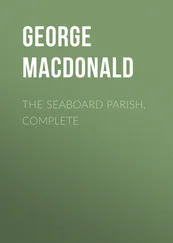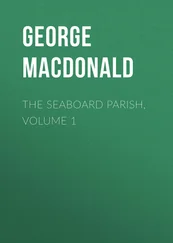He had had a good mother, and his father was a man of some character, both intellectually and socially. Now and then, it is too true, he had terrible bouts of drinking; but all the time between he was perfectly sober. He had given his son more than a fair education; and George, for his part, had trotted through the curriculum of Elphinstone College not altogether without distinction. But beyond this his father had entirely neglected his future, not even revealing to him the fact—of which, indeed, he was himself but dimly aware—that from wilful oversight on his part and design on that of others, his property had all but entirely slipped from his possession.
While his father was yet alive, George married the daughter of a small laird in a neighbouring county—a woman of some education, and great natural refinement. He took her home to the ancient family house in the city—the same in which he now occupied a garret, and under whose outer stair he now cobbled shoes. There, during his father's life, they lived in peace and tolerable comfort, though in a poor enough way. It was all, even then, that the wife could do to make both ends meet; nor would her relations, whom she had grievously offended by her marriage, afford her the smallest assistance. Even then, too, her husband was on the slippery incline; but as long as she lived she managed to keep him within the bounds of what is called respectability. She died, however, soon after Gibbie was born; and then George began to lose himself altogether. The next year his father died, and creditors appeared who claimed everything. Mortgaged land and houses, with all upon and in them, were sold, and George left without a penny or any means of winning a livelihood, while already he had lost the reputation that might have introduced him to employment. For heavy work he was altogether unfit; and had it not been for a bottle companion—a merry, hard-drinking shoemaker—he would have died of starvation or sunk into beggary.
This man taught him his trade, and George was glad enough to work at it, both to deaden the stings of conscience and memory, and to procure the means of deadening them still further. But even here was something in the way of improvement, for hitherto he had applied himself to nothing, his being one of those dreamful natures capable of busy exertion for a time, but ready to collapse into disgust with every kind of effort.
How Gibbie had got thus far alive was a puzzle not a creature could have solved. It must have been by charity and ministration of more than one humble woman, but no one now claimed any particular interest in him—except Mrs. Croale, and hers was not very tender. It was a sad sight to some eyes to see him roving the streets, but an infinitely sadder sight was his father, even when bent over his work, with his hands and arms and knees going as if for very salvation. What thoughts might then be visiting his poor worn-out brain I cannot tell; but he looked the pale picture of misery. Doing his best to restore to service the nearly shapeless boots of carter or beggar, he was himself fast losing the very idea of his making, consumed heart and soul with a hellish thirst. For the thirst of the drunkard is even more of the soul than of the body. When the poor fellow sat with his drinking companions in Mistress Croale's parlour, seldom a flash broke from the reverie in which he seemed sunk, to show in what region of fancy his spirit wandered, or to lighten the dulness that would not unfrequently invade that forecourt of hell. For even the damned must at times become aware of what they are, and then surely a terrible though momentary hush must fall upon the forsaken region. Yet those drinking companions would have missed George Galbraith, silent as he was, and but poorly responsive to the wit and humour of the rest; for he was always courteous, always ready to share what he had, never looking beyond the present tumbler—altogether a genial, kindly, honest nature. Sometimes, when two or three of them happened to meet elsewhere, they would fall to wondering why the silent man sought their company, seeing he both contributed so little to the hilarity of the evening, and seemed to derive so little enjoyment from it. But I believe their company was necessary as well as the drink to enable him to elude his conscience and feast with his imagination. Was it that he knew they also fought misery by investments in her bonds—that they also were of those who by Beelzebub would cast out Beelzebub—therefore felt at home, and with his own?
CHAPTER III.
MISTRESS CROALE.
Table of Contents
The house at which they met had yet not a little character remaining. Mistress Croale had come in for a derived worthiness, in the memory, yet lingering about the place, of a worthy aunt deceased, and always encouraged in herself a vague idea of obligation to live up to it. Hence she had made it a rule to supply drink only so long as her customers kept decent—that is, so long as they did not quarrel aloud, and put her in danger of a visit from the police; tell such tales as offended her modesty; utter oaths of any peculiarly atrocious quality; or defame the Sabbath Day, the Kirk, or the Bible. On these terms, and so long as they paid for what they had, they might get as drunk as they pleased, without the smallest offence to Mistress Croale. But if the least unquestionable infringement of her rules occurred, she would pounce upon the shameless one with sudden and sharp reproof. I doubt not that, so doing, she cherished a hope of recommending herself above, and making deposits in view of a coming balance-sheet. The result for this life so far was, that, by these claims to respectability, she had gathered a clientele of douce, well-disposed drunkards, who rarely gave her any trouble so long as they were in the house though sometimes she had reason to be anxious about the fate of individuals of them after they left it.
Another peculiarity in her government was that she would rarely give drink to a woman. "Na, na," she would say, "what has a wuman to dee wi' strong drink! Lat the men dee as they like, we canna help them." She made exception in behalf of her personal friends; and, for herself, was in the way of sipping—only sipping, privately, on account of her "trouble," she said—by which she meant some complaint, speaking of it as if it were generally known, although of the nature of it nobody had an idea. The truth was that, like her customers, she also was going down the hill, justifying to herself every step of her descent. Until lately, she had been in the way of going regularly to church, and she did go occasionally yet, and always took the yearly sacrament; but the only result seemed to be that she abounded the more in finding justifications, or, where they were not to be had, excuses, for all she did. Probably the stirring of her conscience made this the more necessary to her peace.
If the Lord were to appear in person amongst us, how much would the sight of him do for the sinners of our day? I am not sure that many like Mistress Croale would not go to him. She was not a bad woman, but slowly and surely growing worse.
That morning, as soon as the customer whose entrance had withdrawn her from her descent on Gibbie, had gulped down his dram, wiped his mouth with his blue cotton handkerchief, settled his face into the expression of a drink of water, gone demurely out, and crossed to the other side of the street, she would have returned to the charge, but was prevented by the immediately following entrance of the Rev. Clement Sclater—the minister of her parish, recently appointed. He was a man between young and middle-aged, an honest fellow, zealous to perform the duties of his office, but with notions of religion very beggarly. How could it be otherwise when he knew far more of what he called the Divine decrees than he did of his own heart, or the needs and miseries of human nature? At the moment, Mistress Croale was standing with her back to the door, reaching up to replace the black bottle on its shelf, and did not see the man she heard enter.
Читать дальше












